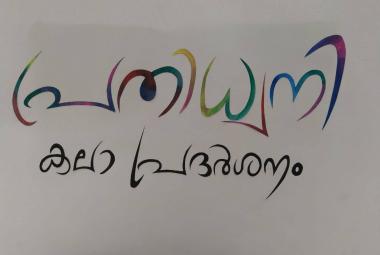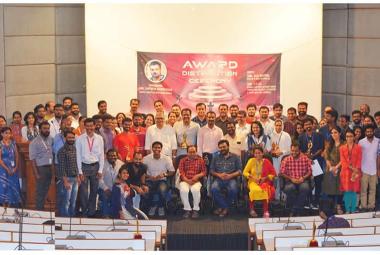Jaidev Chandrasekharan
UST Global Campus
Artificial intelligence and future job thoughts
Artificial intelligence, which used to be a theme of science fiction until two decades ago has become a major transformative force in our planet at the moment. With or without our knowing we use some form of AI in our life and work every day. A machine learning based predictive model makes sure that all unwanted emails go to your spam folder without bothering you. When you login to Amazon or Netflix, they show you recommendations based on your behaviour patterns which they learned with the help of Machine learning.
With the arrival of deep learning algorithms which makes use of Artificial neural networks, the growth of AI acquired a pace none ever imagined. Many marvellous achievements including Sofia, the intelligent robot, self-driving cars were made possible by this.
These changes which are already happening in a rapid pace are further expected to speed up, once we start making use of Quantum computing technology, which is still in its early stages.
What will happen to our jobs as AI continue to enhance its capabilities?
To answer this question sensibly, let us look at it from a long-term perspective. If we imagine our future after two or three decades, we can see that it is unavoidable that AI powered programs and robots will replace majority of the "jobs" that are carried out by human beings today.
Jobs that may go extinct first would be the repetitive tasks, tasks that require physical labour and tasks that are hazardous in nature. But as AI algorithms evolve further, it is possible that it may replace even the tasks that require critical thinking and creativity.
Human computer programmers could become redundant with the arrival of advanced AI powered programs that are capable of enhancing themselves as required.
Even parts of a Doctor's job can be taken over by AI. With the arrival of sophisticated learning and prediction algorithms, an AI doctor would be able to diagnose diseases with more accuracy than a human doctor. Also, AI powered robots would be able to perform critical surgeries with no room for human errors. Not only that, an AI doctor program would be able to diagnose and treat hundreds of patients all at the same time, while a human doctor can practically address only one patient at a time. Once we reach this stage of technological advancement, there is no reason why we should not use the AI doctor just to keep the human doctor employed. Because, the reason why we have doctors is to keep the society healthy, and not for the sake of keeping the profession.
Another example is the job of drivers, which would be replaced by self-driving vehicles. This is a major employment concern in a country like India. The Road transport minister of India has recently made a statement that the country has no plan to introduce driver-less cars in the industry anytime soon, because the government is concerned about the jobs of around 4 million drivers in the country. Though this is a humanitarian stand, it is yet to be seen how any country can resist the onslaught of this fast-evolving technology in long run. A major share of road accidents is caused by human errors which includes road rage, drunk driving, sleep deprived drivers, use of mobile phone during driving etc. An advanced AI driver will never have these problems. This means a drastic reduction in the number of road accidents. Think about a complicated intersection where the self-driving cars approaching from different directions talk among themselves and create a right of way protocol before they reach the intersection. Such a solution can even save the cost of setting up traffic lights.
AI is going to be an unavoidable element in various sectors including Defence, Agriculture, Retail, Banking etc. Even if some country or community decides to keep away from this, they will not be able to do that for long, because they will be at a disadvantage compared to the early adopters. So, it is a probable assumption that everyone will end up welcoming AI in almost every sphere of life sooner or later.
Should we worry about our jobs?
My opinion is that once all the hard labour has been taken over by AI systems, humans will be able to focus on the kind of activities associated with their creative self-expression. There may be more scientists, innovators, philosophers, artists etc. I am making a broad assumption that this society will be a prosperous one because of the efficient labour and service provided by the machines, augmented by absence of corruption. So humans should have the necessary resources to meet their needs without working. Such a society is called "Post work society".
To make sure that people in a post work society have income, policy makers across the world are discussing a concept known as the Universal Basic Income (UBI). If this is implemented, the Government should make sure that every citizen receives sufficient income to meet his or her basic needs.
The point I was trying to say is that it is inevitable that most of our jobs will go obsolete in the next two or three decades. We and our children need to be prepared for it.
How will we prepare for this change?
The kind of education we receive in our Schools and Colleges may become insignificant in long run. We are living in a world of information deluge. It is very easy to find the information we need when we need it without having to memorize much. What the world needs are people who knows how to make use of the available information, rather than someone who remembers so many information in his or her head.
The skills humans would require most in the age of AI would be learning, unlearning and relearning on demand.
There is a widely accepted notion among educational experts about what should be the focus of education in 21st century. That is known as the 4 Cs of education - Creativity, Collaboration, Communication and Critical thinking.
Conclusion
I would like to conclude this article by pointing out that it is inevitable that AI will disrupt our life styles and work environments drastically in the coming decades. We have to be prepared for the changes by mastering the art of learning, unlearning and relearning. And for our children, even if we are not able to change the educational system, we would be able to make conscious effort to make sure that they master the 4 C's of education for 21st century, which are Creativity, Collaboration, Communication and Critical thinking.



